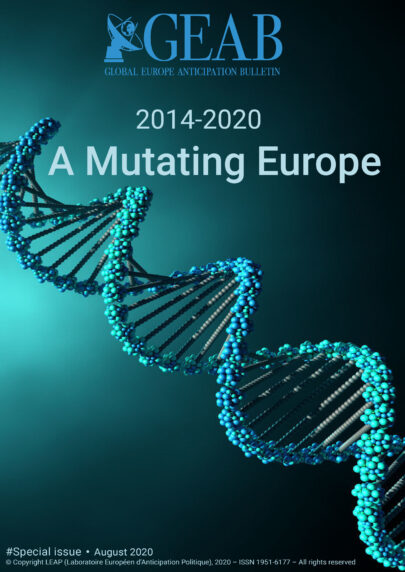GEAB Special file
The prospects for social reorganisation that can be imagined from the current health crisis are enormous. We have, therefore, decided to focus on Europe, about which we are much more certain than we are about the rest of the world. But certain trends of transformation will be the same everywhere.
Governance: strengthening regional and global policy coordination bodies – In the 2010s, the “populists” took over the technocracies of the 90s and 2000s, once again linking governance to the concerns of “the people”. That said, they still aren’t at the right level of power and, for at least a year, we have been analysing a transfer of their political agendas to supra-national levels. By affecting all economies without exception, COVID-19 considerably reinforces the relevance of the “major levels” of decision and action – much more surely than the migration crisis, for example, which led most EU countries only to pass the responsibilities on to border areas (Greece, Italy, Bulgaria, Spain); or the terrorist crisis, whose federating potential was ethically dangerous. The virus has a great quality: it is a “humanist”. Although the Chinese and Americans are starting to cast aspersions on one another each accusing the other of being at the origin of the problem, whether men, women, gays, heterosexuals, Jews, Arabs etc., the virus itself puts us all in the same bag. [1]
Inflation: towards a return – At the beginning of the health crisis, the much hoped for inflation receded.[2] But we don’t think this situation is set to last long or beyond the crisis. In reality, the disruption caused to supply and production chains will create a situation where production methods will become more expensive and will be forced to reorganise (knowing China has probably permanently turned part of the flow of its immense production machine back on itself) and goods will become scarcer as demand picks up again… even if oil prices remain below 50 USD/barrel. Another argument in favour of inflation is linked to the point on banks (below). Banks are loaded with reserves of liquidity from QE and it is this storage that has prevented monetary printing from producing galloping inflation.[3] If we are right, and European banks are set on a plan for the economic and financial reconstruction of the continent, this liquidity, when it comes out of their coffers, will recreate inflation. This mechanism could even carry a risk of hyperinflation, but if everything is in place to absorb this money in large modern infrastructure projects (railways, health, social, defence, AI…) as we analyse it, this trend should be contained.
Login

The corona crisis has been the trigger for the EU to finally start issuing common bonds. It was a modest and hard-won step forward. In the midst of the flames, [...]
The editorial GEAB team decided to share, exceptionally, with its readers an excerpt of the as yet unpublished document entitled "Community or Empire"; a book written by Franck Biancheri in [...]
A long time ago, in 1998, Franck Biancheri, our regretfully departed director of studies, signed an anticipatory article entitled: « 2009, when Europe ends up in the hands of the grandsons [...]
Since its creation, the Global Europe Anticipation Bulletin has been designed among other things to inform European public opinion and decision makers about the fact that the global geopolitical reconfiguration [...]
This anticipation is not very original but it must nevertheless be faced with all the lucidity required. It is hardly a hypothesis, but rather a certainty: the allied European far [...]
The financial crisis followed by the debt crisis has led to a substantial change in the mandate of the European Central Bank (ECB) and to more political provisions. The ECB [...]
There is a lot about epilogues in this issue! In the case of the EU (a phase in the construction of Europe which came into being on 7 February 1992 [...]
There’s no need to wait for the results of the election to anticipate some of the major features of the new Europe that will be established after June 2019. Certainly, [...]

Comments